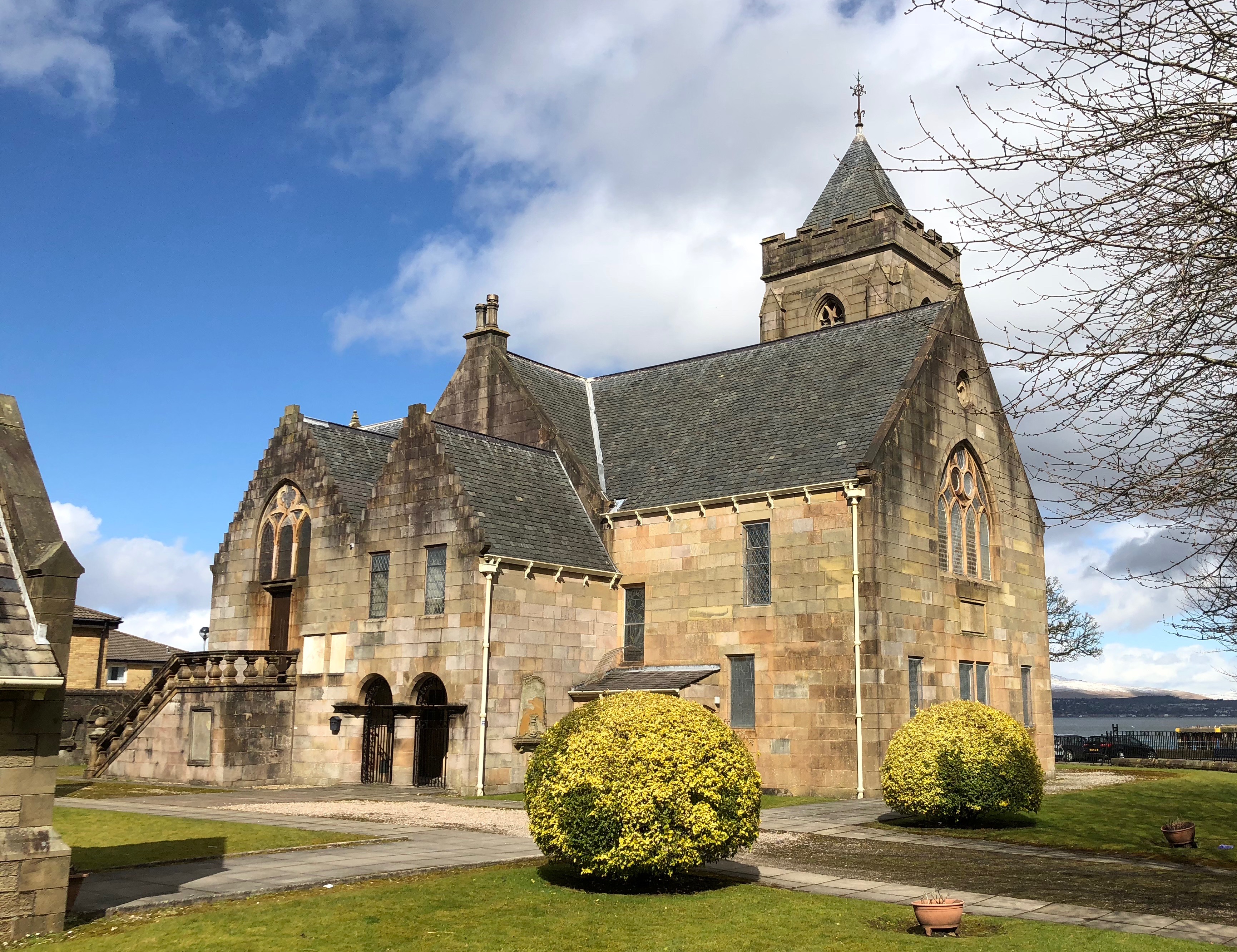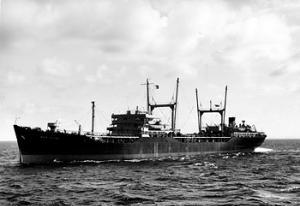|
Empire Frost
''Empire Frost'' was a cargo ship which was built in 1940 by Lithgows, Port Glasgow for the Ministry of War Transport. She was bombed and sunk in St Georges Channel on 13 March 1941 on the return leg of her maiden voyage. Description The ship was overall, with a beam of . She had a depth of . She was assessed at , ,. The ship was propelled by a triple expansion steam engine.The engine was built by Rankine & Blackmore, Greenock. It drove a single screw propeller. History The ship was built as yard number 939 by Lithgows, Port Glasgow for the Ministry of War Transport. She was launched on 2 September 1940 and completed on December. ''Empire Frost'' was allocated the United Kingdom Official Number 166992. Her port of registry was Greenock and she was operated under the management of G Heyn & Sons Ltd, Greenock. ''Empire Frost'' departed from the Clyde on 11 January 1941 on her maiden voyage. She joined Convoy OB 272, which had departed from Liverpool the previous day and ... [...More Info...] [...Related Items...] OR: [Wikipedia] [Google] [Baidu] |
Greenock
Greenock (; sco, Greenock; gd, Grianaig, ) is a town and administrative centre in the Inverclyde council areas of Scotland, council area in Scotland, United Kingdom and a former burgh of barony, burgh within the Counties of Scotland, historic county of Renfrewshire (historic), Renfrewshire, located in the west central Lowlands of Scotland. It forms part of a contiguous urban area with Gourock to the west and Port Glasgow to the east. The United Kingdom Census 2011, 2011 UK Census showed that Greenock had a population of 44,248, a decrease from the 46,861 recorded in the United Kingdom Census 2001, 2001 UK Census. It lies on the south bank of the Clyde at the "Tail of the Bank" where the River Clyde deepens into the Firth of Clyde. History Name Place-name scholar William J. Watson wrote that "Greenock is well known in Gaelic as Grianáig, dative of grianág, a sunny knoll". The Scottish Gaelic place-name ''Grianaig'' is relatively common, with another (Greenock) near Calla ... [...More Info...] [...Related Items...] OR: [Wikipedia] [Google] [Baidu] |
Loch Ewe
Loch Ewe ( gd, Loch Iùbh) is a sea loch in the region of Wester Ross in the Northwest Highlands of Scotland. The shores are inhabited by a traditionally Gàidhlig-speaking people living in or sustained by crofting villages, the most notable of which, situated on the north-eastern shore, is the Aultbea settlement. History Due to the rugged and inaccessible terrain in which it is located, Loch Ewe has always been an assembly point for maritime trade. Around 1610 the area at the head of Loch Ewe, today known as Poolewe, was urbanised around an iron furnace using charcoal produced in the surrounding woodlands for fuel. English ironmasters found it more economic to ship the ore to Poolewe for smelting than to ship the processed charcoal to England to run furnaces there. The crofting villages which were established in the 1840s, as a result of the local parish's estate being reformed from run-rig to fixed holdings properties, were always quite small. Bualnaliub, nine miles (f ... [...More Info...] [...Related Items...] OR: [Wikipedia] [Google] [Baidu] |
Cargo Ships Sunk By Aircraft
Cargo consists of bulk goods conveyed by water, air, or land. In economics, freight is cargo that is transported at a freight rate for commercial gain. ''Cargo'' was originally a shipload but now covers all types of freight, including transport by rail, van, truck, or intermodal container. The term cargo is also used in case of goods in the cold-chain, because the perishable inventory is always in transit towards a final end-use, even when it is held in cold storage or other similar climate-controlled facility. The term freight is commonly used to describe the movements of flows of goods being transported by any mode of transportation. Multi-modal container units, designed as reusable carriers to facilitate unit load handling of the goods contained, are also referred to as cargo, especially by shipping lines and logistics operators. Similarly, aircraft ULD boxes are also documented as cargo, with an associated packing list of the items contained within. When empty conta ... [...More Info...] [...Related Items...] OR: [Wikipedia] [Google] [Baidu] |
Maritime Incidents In March 1941
Maritime may refer to: Geography * Maritime Alps, a mountain range in the southwestern part of the Alps * Maritime Region, a region in Togo * Maritime Southeast Asia * The Maritimes, the Canadian provinces of Nova Scotia, New Brunswick, and Prince Edward Island * Maritime County, former county of Poland, existing from 1927 to 1939, and from 1945 to 1951 * Neustadt District, Reichsgau Danzig-West Prussia, known from 1939 to 1942 as ''Maritime District'', a former district of Reichsgau Danzig-West Prussia, Nazi Germany, from 1939 to 1945 * The Maritime Republics, thalassocratic city-states on the Italian peninsula during the Middle Ages Museums * Maritime Museum (Belize) * Maritime Museum (Macau), China * Maritime Museum (Malaysia) * Maritime Museum (Stockholm), Sweden Music * ''Maritime'' (album), a 2005 album by Minotaur Shock * Maritime (band), an American indie pop group * "The Maritimes" (song), a song on the 2005 album ''Boy-Cott-In the Industry'' by Classified * "Maritime" ... [...More Info...] [...Related Items...] OR: [Wikipedia] [Google] [Baidu] |
Steamships Of The United Kingdom
A steamship, often referred to as a steamer, is a type of steam-powered vessel, typically ocean-faring and seaworthy, that is propelled by one or more steam engines that typically move (turn) propellers or paddlewheels. The first steamships came into practical usage during the early 1800s; however, there were exceptions that came before. Steamships usually use the prefix designations of "PS" for ''paddle steamer'' or "SS" for ''screw steamer'' (using a propeller or screw). As paddle steamers became less common, "SS" is assumed by many to stand for "steamship". Ships powered by internal combustion engines use a prefix such as "MV" for ''motor vessel'', so it is not correct to use "SS" for most modern vessels. As steamships were less dependent on wind patterns, new trade routes opened up. The steamship has been described as a "major driver of the first wave of trade globalization (1870–1913)" and contributor to "an increase in international trade that was unprecedented in huma ... [...More Info...] [...Related Items...] OR: [Wikipedia] [Google] [Baidu] |
Ministry Of War Transport Ships
Ministry may refer to: Government * Ministry (collective executive), the complete body of government ministers under the leadership of a prime minister * Ministry (government department), a department of a government Religion * Christian ministry, activity by Christians to spread or express their faith ** Minister (Christianity), clergy authorized by a church or religious organization to perform teaching or rituals ** Ordination, the process by which individuals become clergy * Ministry of Jesus, activities described in the Christian gospels * ''Ministry'' (magazine), a magazine for pastors published by the Seventh-day Adventist Church Music * Ministry (band), an American industrial metal band * Ministry of Sound, a London nightclub and record label Fiction * Ministry (comics), a horror comic book created by writer-artist Lara J. Phillips * Ministry of Magic, governing body in the ''Harry Potter'' series * Ministry of Darkness, a professional wrestling stable led by Th ... [...More Info...] [...Related Items...] OR: [Wikipedia] [Google] [Baidu] |
Empire Ships
An Empire ship is a merchant ship that was given a name beginning with "Empire" in the service of the Government of the United Kingdom during and after World War II. Most were used by the Ministry of War Transport (MoWT), which owned them and contracted their operation to various shipping companies of the British Merchant Navy. Empire ships came from two main sources: new construction, and capture and seizure. New Empire ships were built for the MoWT or obtained from the United States to increase Britain's shipping capacity and offset losses to German U-boats, commerce raiders, bombing and other enemy actions in the tonnage war Germany was waging against Britain's sea transport around the globe. Others were captured or seized from enemy powers and some were acquired by requisition or normal purchase or lease. New Empire ship construction represented an enormous undertaking that included classes of freighters, tankers, aircraft carriers, fast cargo liners, tank landing ships, Dee ... [...More Info...] [...Related Items...] OR: [Wikipedia] [Google] [Baidu] |
Ships Built In Glasgow
A ship is a large watercraft that travels the world's oceans and other sufficiently deep waterways, carrying cargo or passengers, or in support of specialized missions, such as defense, research, and fishing. Ships are generally distinguished from boats, based on size, shape, load capacity, and purpose. Ships have supported exploration, trade, warfare, migration, colonization, and science. After the 15th century, new crops that had come from and to the Americas via the European seafarers significantly contributed to world population growth. Ship transport is responsible for the largest portion of world commerce. The word ''ship'' has meant, depending on the era and the context, either just a large vessel or specifically a ship-rigged sailing ship with three or more masts, each of which is square-rigged. As of 2016, there were more than 49,000 merchant ships, totaling almost 1.8 billion dead weight tons. Of these 28% were oil tankers, 43% were bulk carriers, and 13% were con ... [...More Info...] [...Related Items...] OR: [Wikipedia] [Google] [Baidu] |
1940 Ships
Year 194 ( CXCIV) was a common year starting on Tuesday (link will display the full calendar) of the Julian calendar. At the time, it was known as the Year of the Consulship of Septimius and Septimius (or, less frequently, year 947 ''Ab urbe condita''). The denomination 194 for this year has been used since the early medieval period, when the Anno Domini calendar era became the prevalent method in Europe for naming years. Events By place Roman Empire * Emperor Septimius Severus and Decimus Clodius Septimius Albinus Caesar become Roman Consuls. * Battle of Issus: Septimius Severus marches with his army (12 legions) to Cilicia, and defeats Pescennius Niger, Roman governor of Syria. Pescennius retreats to Antioch, and is executed by Severus' troops. * Septimius Severus besieges Byzantium (194–196); the city walls suffer extensive damage. Asia * Battle of Yan Province: Warlords Cao Cao and Lü Bu fight for control over Yan Province; the battle lasts for over 100 days ... [...More Info...] [...Related Items...] OR: [Wikipedia] [Google] [Baidu] |
London
London is the capital and largest city of England and the United Kingdom, with a population of just under 9 million. It stands on the River Thames in south-east England at the head of a estuary down to the North Sea, and has been a major settlement for two millennia. The City of London, its ancient core and financial centre, was founded by the Romans as '' Londinium'' and retains its medieval boundaries.See also: Independent city § National capitals The City of Westminster, to the west of the City of London, has for centuries hosted the national government and parliament. Since the 19th century, the name "London" has also referred to the metropolis around this core, historically split between the counties of Middlesex, Essex, Surrey, Kent, and Hertfordshire, which largely comprises Greater London, governed by the Greater London Authority.The Greater London Authority consists of the Mayor of London and the London Assembly. The London Mayor is distinguished fr ... [...More Info...] [...Related Items...] OR: [Wikipedia] [Google] [Baidu] |
Tower Hill Memorial
The Tower Hill Memorial is a pair of Commonwealth War Graves Commission memorials in Trinity Square Gardens, on Tower Hill in London, England. The memorials, one for the First World War and one for the Second, commemorate civilian, merchant seafarers and fishermen who were killed as a result of enemy action and have no known grave. The first, the Mercantile Marine War Memorial, was designed by Sir Edwin Lutyens and unveiled in 1928; the second, the Merchant Seamen's Memorial, was designed by Sir Edward Maufe and unveiled in 1955. A third memorial, commemorating merchant seamen who were killed in the 1982 Falklands War, was added to the site in 2005. The first memorial was commissioned in light of the heavy losses sustained by merchant shipping in the First World War—more than 17,000 people died and some 3,300 British and Empire-registered commercial vessels sunk as a result of enemy action. The Imperial War Graves Commission (IWGC) commissioned Lutyens, who initially designed a ... [...More Info...] [...Related Items...] OR: [Wikipedia] [Google] [Baidu] |
Kampfgeschwader 27
'Kampfgeschwader' 27 ''Boelcke'' was a Luftwaffe medium bomber wing of World War II. Formed in May 1939, KG 27 first saw action in the German invasion of Poland in September 1939. During the Phoney War—September 1939 – April 1940—the bomber wing flew armed reconnaissance missions over France. In May 1940 it fought in the Battle of Belgium and Battle of France through to the end of the campaigns in June 1940. In July 1940, KG 27 fought in the Battle of Britain and The Blitz until June 1941. In June 1941 the unit's ''Gruppen'' participated in Operation Barbarossa and spent the next years on the Eastern front until 1944, until it was withdrawn to assist the evacuation of the German-occupied region. It returned to the Eastern Front until November 1944. At this time, all three combat groups remained operational but were converted to fighter units for Defence of the Reich duties. It is not known when KG 27 was disbanded. An anti-locomotive staffel was known to h ... [...More Info...] [...Related Items...] OR: [Wikipedia] [Google] [Baidu] |





